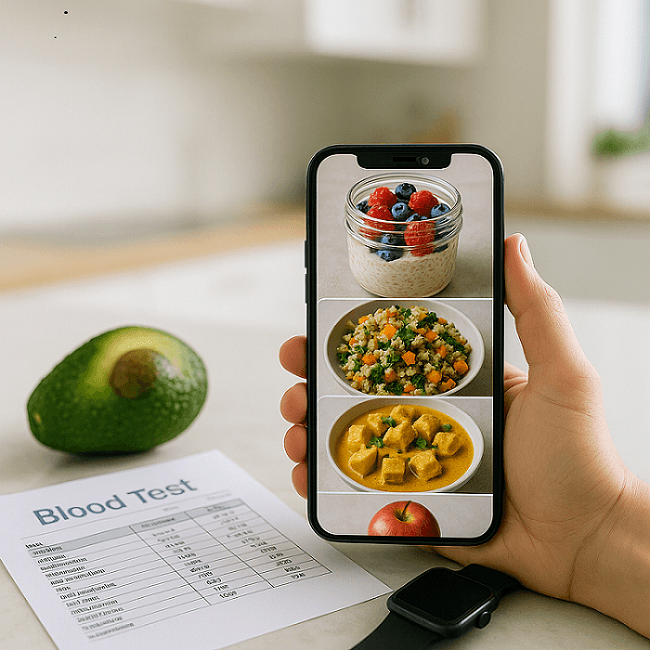Personalized Nutrition with AI: Create Your Perfect Meal Plan

✍️ Introduction
“You are what you eat,” said Hippocrates. In 2025, this phrase has gone digital: artificial intelligence can now analyze your lifestyle, DNA, and even gut microbiome to create a diet plan tailored exactly to you.
Forget one-size-fits-all diets — AI services offer individualized recommendations based on health data, physical activity, preferences, and even your mood.
But how do these tools work? Which ones are worth trying? And can you really trust a machine with your nutrition?
Welcome to the new era of AI-powered nutrition 👇
Table of Contents
- How AI-Powered Nutrition Works
- Top 5 AI Services for Personalized Diets
- Getting Started: Tests, Goals, Inputs
- Example: 7-Day AI Meal Plan
- Pros and Risks of AI Diets
- The Future of Personalized Nutrition
- Conclusion: Should You Try It?
🧬 How AI-Powered Nutrition Works
AI systems rely on:
- Your body data (blood tests, genetics, weight, allergies)
- Your lifestyle (sleep, stress, movement)
- Your goals (weight loss, energy boost, skin health)
- Your preferences (diet type, allergies, religious restrictions)
The output? A personalized diet plan including meal suggestions, recipes, shopping lists, and timing.
⚙️ Technologies involved:
- NLP (e.g. food journal analysis)
- Computer Vision (e.g. food recognition from images)
- Machine Learning (e.g. plan adaptation based on results)
🧠 Quote:
“The ideal diet isn’t a plan. It’s a live algorithm adapting to your body.” — Tim Spector, professor of genetic epidemiology.
🧾 Top 5 AI Services for Personalized Diets
|
Service |
Description |
Features |
Price |
|
DNA & gut microbiome based |
Requires test kits |
from $299 |
|
|
Breath analysis for carb/fat tracking |
Includes device + app |
$249 |
|
|
Health + nutrition monitoring |
Chronic condition-friendly |
Free / Subscription |
|
|
Daily AI meal assistant |
Recipe generation from your ingredients |
Free |
|
|
Food image recognition |
Syncs with Apple Health |
Freemium |
🧪 Getting Started: Tests, Goals, Inputs
To get accurate recommendations from AI, you'll need:
- Basic medical tests: blood panel, gut microbiome, glucose
- Set clear goals: weight loss, energy, skin, gut health
- Add preferences: vegan, keto, gluten-free, food restrictions
- (Optional) Connect health trackers: Apple Watch, Oura, Fitbit
🤖 Prompt Example:
“I'm vegan, want to lose 5kg, allergic to nuts, and have hypoglycemia. Create a 3-day plan with macros and a shopping list.”
🍲 Example: 7-Day AI Meal Plan
|
Day |
Breakfast |
Lunch |
Dinner |
Snack |
|
Mon |
Oats with berries |
Quinoa & veggies |
Tofu curry |
Apple |
|
Tue |
Protein smoothie |
Chickpea salad |
Buckwheat & mushrooms |
Almonds |
|
Wed |
Chia pudding |
Lentils & tomatoes |
Rice & beans |
ZOE bar |
🧊 The plan can be adjusted by AI in real-time based on calories, sleep, or even your climate.
⚖️ Pros and Risks of AI Diets
Pros:
- Saves time (no more meal planning or macro math)
- Fully personalized
- Supports chronic conditions or specific health goals
Risks:
- Data gaps may lead to inaccurate plans
- Mental/emotional aspects of eating not always considered
- Premium access is often required
🚀 The Future of Personalized Nutrition
AI is merging with:
- Smart kitchens: fridges that recommend meals
- Voice assistants: plan meals based on your calendar
- Biomonitoring: food becomes a real-time prescription
🥼 In development: AIs that adapt plans based on live gut microbiome feedback. Personalized nutrition is becoming the core of preventive healthcare.
🧩 Conclusion: Should You Try It?
AI-powered nutrition isn’t a trend — it’s the future of mindful eating. If you're tired of cookie-cutter diets, try approaching your plate with science... and a bit of smart code.
👉 Choose one AI service and let it design your perfect plan. You may be surprised how well it knows your needs!
